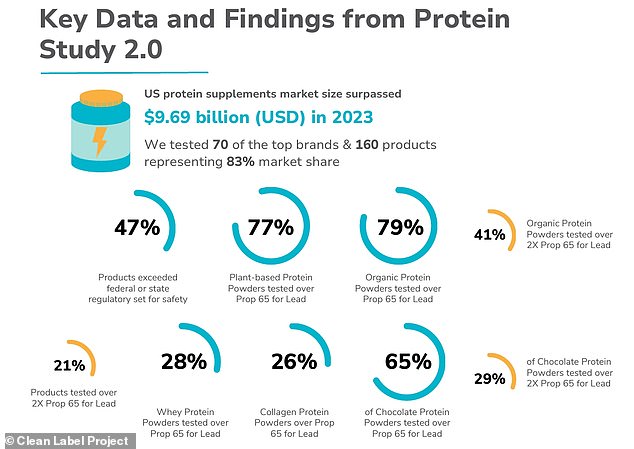Nearly half of protein powders on the market contain dangerous levels of toxic heavy metals linked to cancer and autism, testing suggests.
Researchers found lead, arsenic and cadmium, metals linked to linked to cancer, brain damage and autism, in the most popular supplements sold across the US.
In an experiment that tested 160 products, Clean Label Project determined that the plant-based and all-natural nutritional supplements were the worst offenders, with more than three-quarters of them testing positive for high lead levels.
‘This study serves as a wake-up call for consumers, manufacturers, retailers, and regulators alike,’ Clean Label Project said.
‘With the lack of comprehensive federal regulations specifically addressing heavy metals in dietary supplements, it is critical that the industry independently takes proactive measures.’
In addition to testing for lead, exposure to which can also cause organ damage, high blood pressure, and anemia, researchers tested for heavy metals like cadmium and arsenic, and bisphenols, which have been linked to cancers of the skin, lungs, prostate, kidney, bladder, liver, breast, ovaries, testicles, and uterus.
No amount of lead exposure is safe. But because it naturally occurs in the earth’s crust and has been used in modern industry for centuries, it is impossible to eliminate it from life and the environment altogether.
Organic products were found to have higher levels of heavy metal contamination, averaging three times the amount of lead and double the cadmium compared to the non-organic options tested.


Plant-based protein powders were especially problematic, also containing three times more lead than whey-based powders.
Further, chocolate-flavored powders contained around four times more lead than vanilla varieties.
The reason plant-based products were higher in metals is because plants naturally absorb heavy metals from soil that has been contaminated by mining, industrial waste, and some pesticides and fertilizers.
Similarly, cacao beans can absorb lead from the ground or air during the fermentation and drying process, which would explain why chocolate flavor was particularly problematic.
Lead poisoning has been linked to reduced IQ and developmental delays in children, as well as kidney and brain damage, heart disease, infertility, thyroid dysfunction, memory loss and Alzheimer’s disease in adults.
California’s Proposition 65 sets a maximum safety level for lead exposure at 0.5 micrograms per day to prevent reproductive harm.
This standard is stricter than federal limits and applies specifically to warning requirements for products sold in the state.
The Clean Label Project used Prop 65 as a marker.

Over 79 percent of organic powders exceeded the Prop 65 lead level, and 41 percent had a level twice the law’s maximum.
Seventy-seven percent of plant-based powders tested higher than advised for lead compared to 28 percent of whey powders and 26 percent of collagen powders.
The report said: ‘Plant-based protein powders were the most contaminated, containing five times more cadmium than their whey-based counterparts.
Even the flavor of protein powder played a significant role in contamination levels. Chocolate protein powders, for instance, were found to have a staggering 110 times more cadmium than vanilla-flavored varieties.
Sixty-five percent of chocolate powders tested above max lead safety levels.
A previous investigation by Clean Label Project found similarly troubling results regarding troublesome contaminants.
In that report, over half of the protein powders tested had high levels of BPA, or bisphenol A. BPA is a chemical commonly used in plastics that disrupts hormones in the body, causing fertility issues, sexual development problems, and other problems.
BPA exposure has increasingly been linked in research to breast cancer. BPA is an endocrine disruptor that mimics the hormone estrogen, which leads to changes in hormome levels that can lead to the growth and spread of cancer cells.
At the same time, 74 percent of them contained unsafe levels of cadmium, which can damage the kidneys and soften bones. The organic varieties had over two times the amount of heavy metals such as arsenic, lead, and cadmium.
Clean Label Project did not provide the brands that they tested for the latest report.
Harmful chemicals easily leech into plant matter, explaining why the plant-based powders were most contaminated. Plants such as cacao used to make protein powder taste like chocolate, absorb heavy metals from the soil as they grow.
Human behavior—pollution, mining, and the use of leaded gasoline years ago—has made these contaminants plentiful in the environment, where they can enter the food supply.
Organic fertilizers may also contain some of these heavy metals that feed the plants used to make powders and other consumer items. And organic products maintain more of their natural components than other types.
